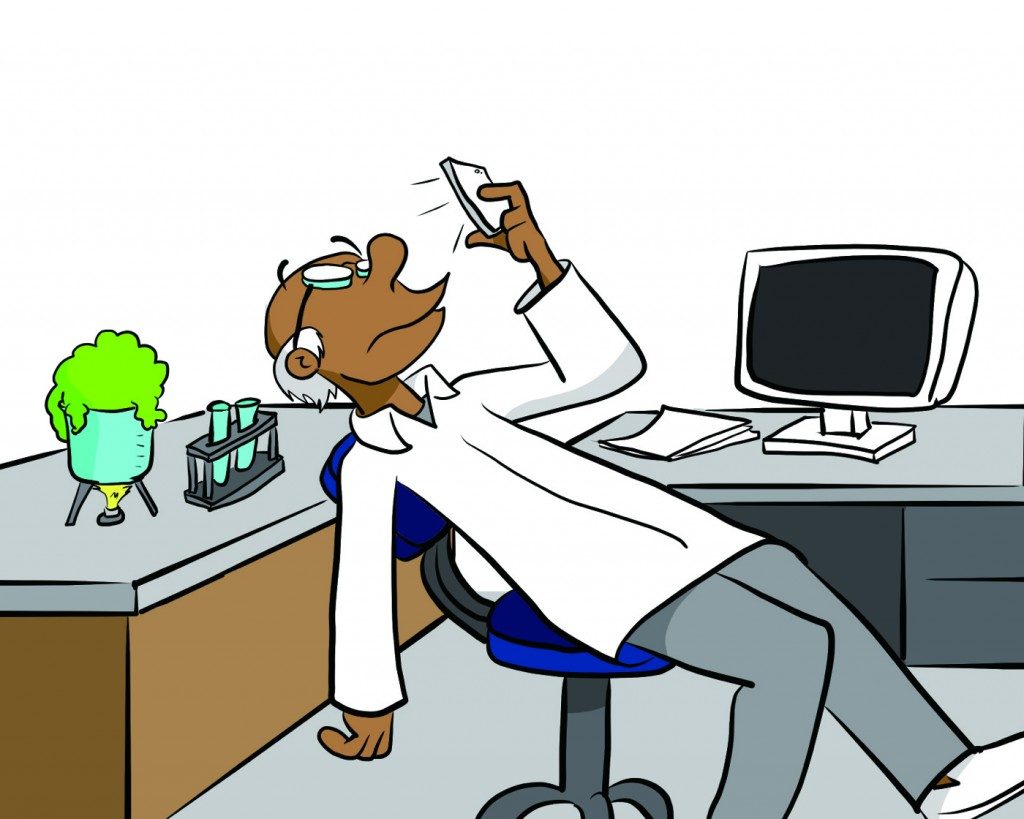
Project delayed by unforeseeable shenanigans
By Carlos Bilan, Staff Writer
Scientists at Toronto-based Productive Discoveries, a company of some sort, have been conducting research for one of their biggest projects, a cure for procrastination.
“Yes, we’ve all decided that a cure for procrastination is what the world needs right now,” said the chemical engineering head of the project, Dr. Adrian Luego M.D. “Did you know that 98.99 per cent of college students experience this phenomenon? It’s very interesting because when you-”
(The interview was paused briefly to allow Dr. Luego to answer his phone.)
“I’m really sorry. There seems to be an urgent matter I must address. I’ll direct you to my assistant Dr. Leigh Terry, you can include what I said to the paper and she can continue where I left off,” said Dr. Luego.
The Other Press was led to Dr. Leigh’s office, where the interview continued.
“As Dr. Luego was saying, we at the College Dilemma division have been looking for a cure for procrastination,” said Dr. Terry. “The statistics are very worrying because it seems like so many students are victims of this. We are hoping to create a pill or product that would destroy the agent that creates procrastination.”
Dr. Terry then gave a tour of the College Dilemma division.
“You see, we have a lot of researchers. Here at Productive Discoveries, we do our very best to create solutions, not problems,” said Dr. Terry. “We really haven’t started the third phase of our research because we want to make sure that everything is perfect, so if you notice that the laboratory equipment appears untouched, that’s the reason why.”
The Other Press was then introduced to one of the researchers: Dr. Peter Dopo, a psychologist and Harvard graduate.
“Some of our research methods include looking through YouTube videos, reading blogs, and reading self-help books which give tips on curing procrastination. In this way, we ensure that we really have a firm grasp on what people should do so they can stop procrastinating,” said Dr. Dopo.
The interview was again interrupted by the sudden reappearance of Dr. Luego, who had exciting news to impart upon his colleagues:
“Hey everyone! Sorry to interrupt, but I just received a call from one of our investors. DRAKE JUST RELEASED A NEW ALBUM!”
Everybody in the College Dilemma division began to cheer. Drake’s first track “Free Smoke” from his new album More Life began to play from all the speakers in the building.
“Yes, this is a daily occurrence,” said the head of the research division, Dr. Roger Später. “Dr. Luego allows us to take breaks quite frequently, because he knows that such a big project requires a lot of time and a lot of thinking. All of us in the department are really happy to be working here.
“Although I must admit that I’m worried about our deadline for our second phase completion. Last time, Dr. Terry made us work overtime to finish the first phase. Apparently, the report was due the following day at 7 a.m., so he called us all in at 11 p.m. to work the graveyard shift. It was very stressful.”
When questioned on the matter, Dr. Luego was quite candid in his response.
“I admit the first phase was not as outstanding as we hoped it would be. The CEO thinks it could be better. He said if it was a graded report, it would be a B-. We finished the job, which is the main thing, but I admit that we probably got a bit carried away there. That’s why I myself have also been taking part in the research process by putting all the videos teaching how to combat procrastination on my ‘Watch Later’ playlist so I can get to them when I finally have the time.”